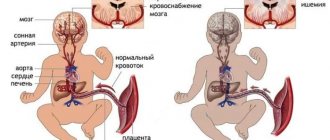Meningitis is a serious infectious disease characterized by a complex course, and a fatal outcome cannot be ruled out if I receive medical assistance in a timely manner. Most often, the disease affects people with weak immune systems, including children, the elderly, cancer patients, and carriers of HIV infection. It's not surprising that many parents are wondering whether the meningitis vaccine is as effective as they say. In this article we will talk in detail about what the meningitis vaccination for children is, its pros and cons, what they are, and who can get it and who can’t.
Symptoms and danger of the disease
Meningococcal infection can be caused by any pathogen, be it a virus, fungi or bacteria. Symptoms of the disease can even be caused by severe head trauma.
There are three pathogens to be wary of:
- meningococci – just over 50% of cases;
- Haemophilus influenzae type b – observed in 39% of patients;
- pneumococci - about 2%.
To prevent the above pathogens from causing primary and secondary severe purulent meningitis, vaccinations against meningitis are given. Primary meningitis is considered the most dangerous, in which it immediately flows from its localization site (nose or pharynx) to the brain, easily overcoming the blood-brain barrier and provoking an inflammatory process.
The primary symptoms of meningitis are similar to the common cold, which makes diagnosing the disease much more difficult. After infection, the body temperature increases, a sharp headache, nausea and even vomiting occurs. In some cases, a hemorrhagic rash forms on the skin.
If children are not vaccinated against meningitis on time, this can cause cerebral edema, as well as the transformation of the disease into secondary encephalitis. As a result, meningoencephalitis appears, accompanied by neurological symptoms. They can persist for a very long period of time after recovery, which quite often leads to disability of the patient.
The highest danger is posed by a brain abscess, which appears as a result of secondary bacterial meningitis resulting from abnormalities of the ENT organs. Such processes stimulate the development of cerebral edema, which will require not only drug therapy, but also surgery.
Such arguments should also dampen the debate about whether to get vaccinated against meningitis.
What is meningitis and why is it dangerous?
Meningitis is an infectious disease. This acute disease is characterized by inflammation of the membranes of the brain and spinal cord.
Helpful information
The causative agents of the inflammatory process can be viruses, bacteria, and fungi. A common microorganism that causes meningitis is meningococcal infection.
It can also be tuberculosis, hemophilus influenzae, enterovirus, but much less frequently.
The danger of meningitis is that people of any age can get it, and re-infection can occur after recovery, despite the fact that after meningitis a person is more likely to develop immunity. But this happens only in 0.1% of cases.
Those who are more likely to become infected with meningitis are those who have a weakened immune system, who have suffered head or back injuries, or who have damage to the central nervous system. If the patient seeks help in time, he will avoid negative consequences in the form of damage to systems and organs and will return to normal faster. It is believed that if treatment is not started on the first day of symptoms, you may lose your hearing or go blind. But this applies to reactive meningitis. This variety can lead a person to coma or death.
Depending on what caused the disease, it depends on whether it will be contagious to others. Experts divide meningitis into primary and secondary. Primary occurs independently and is more often caused by meningococci. It follows that this subtype is contagious, even if caused by an enterovirus.
The secondary type occurs as a consequence of other diseases, and therefore is not always contagious. It occurs due to sinusitis with otitis media, boils. The infection enters the bloodstream, moving to the brain. It turns out that the person infects himself.
If the causative agent of meningitis is fungi or protozoal infections, this disease is not as dangerous for others as for the carrier itself. It is much more complicated and in most cases leads to complications. The most serious type of the disease is amoebic meningitis, which is fatal in 90% of cases.
In other cases, a person can become infected with meningitis in the following ways:
- through unwashed hands;
- when using items or hygiene products used by an infected person;
- when swimming in the pool;
- through blood;
- from mother to child during intrauterine development.
The carrier of the infection becomes potentially dangerous on the second day after infection. But in the first stages it is difficult to distinguish meningitis from a common cold, and this is where the danger lies.
Helpful information
The causative agents of the inflammatory process can be viruses, bacteria, and fungi. A common microorganism that causes meningitis is meningococcal infection.
It can also be tuberculosis, hemophilus influenzae, enterovirus, but much less frequently.
Vaccination schedule and methods of vaccine administration
Babies during breastfeeding are not susceptible to hemophilus influenzae infection, because the necessary antibodies enter their bodies along with their mother's milk. Therefore, up to a year old, babies begin to receive vaccinations after 3 months, in accordance with the vaccination schedule.
The number of vaccinations given depends on the age at which the first one is given.
If the first vaccination is given at 3 months, then a total of three vaccinations will be needed with an interval of one and a half months. Revaccination will be required in one and a half years. In this case, injections are often combined with DPT and Tetracoccus vaccines.
If the first injection was given at 6 months, then only 2 vaccinations will be needed every one and a half months. The vaccination is valid for a certain time, so revaccination will need to be done after 1 year.
Children over one year of age, as well as people suffering from immunodeficiency, are vaccinated once.
Using the Prevenar vaccine as an example, the vaccination schedule will be as follows: at 3, 4.5, 6 months, and revaccination at 18 months.
If the drug Pneumo-23 was chosen as the vaccine, then the injection is given once to a child who has reached 2 years of age.
Vaccination against meningitis is performed in the thigh or shoulder muscle. The drug has good tolerability, while it is able to provide a reliable barrier against Haemophilus influenzae infection.
General information
Meningitis is a dangerous disease that, in the worst case scenario, can be fatal. Mostly young children (infants and older) suffer from this disease. There are three main pathogens:
- Haemophilus influenzae infections.
- Pneumococcal infections.
- Meningococcal infections.
Since there are a huge number of variants of the disease, there may be many more symptoms than listed above.
It is important to understand that this illness is not one that can go away on its own; you cannot joke with it!
So how to protect your child from meningitis? The only effective preventive method is a vaccine. No amount of rubbing and hardening will save a baby or an adult if he stays in an endemic area for a long time or comes into contact with infectious agents.
Yes, the body will resist, but not for as long as the child’s parents or the potential patient himself expect. The infection is insidious and cunning and can overcome the blood-brain barrier, which protects the human central nervous system from various ailments.
Where is vaccination against meningitis carried out?
In a large number of civilized countries, vaccination against meningitis is mandatory, which has made it possible to almost completely get rid of the infection. According to the National Vaccination Calendar of the Russian Federation, due to its high cost, vaccination against meningitis is not mandatory.
In this regard, free vaccinations against meningitis are given only in a number of the following cases:
- During an epidemic, when for every 100,000 people at least a fifth of people become ill.
- If a child staying in a group is suspected of having meningitis. In this case, all children in contact with this child must be vaccinated.
- If the patient’s permanent place of residence is in a region characterized by a high degree of morbidity.
- The child was diagnosed with severe immunodeficiency.
In all other circumstances, parents or patients are required to purchase the vaccine themselves.
How much does it cost to vaccinate children against meningococcal infection - average price
The most dangerous age for contracting meningitis is 2.5-3 years. At this age, immunity has not yet formed, and the baby can easily become infected from any infected patient. The risk of getting sick increases significantly if a child attends preschool institutions or other group activities. Meningitis can lead to serious consequences that can affect a full life in the future. This is why it is important to vaccinate your child.
There are three types of vaccines; to completely protect yourself from the disease, it is advisable to get them all. This:
- Meningococcal.
- Hemophilic.
- Pneumococcal.
Thus, there is no vaccine against meningitis as such. But since the disease often causes complications due to hemophilus influenzae infection penetrating the brain, scientists have developed a vaccine against this particular pathogen.
Less commonly, the disease is caused by pneumococci, but they can be dangerous for children under two years of age. Such meningitis often develops against the background of pneumonia. Therefore, if you vaccinate your child against pneumococci, you can reduce the risk of developing pneumonia. Meningococci lead to purulent inflammation of the membranes of the brain in 54% of patients. Therefore, meningococcal vaccination is also important.
Children are vaccinated against meningococcus starting from the age of two. The drug is administered to the patient intramuscularly or subcutaneously in an amount of 0.5 ml.
Vaccination is recommended for children who often suffer from acute respiratory viral infections, pneumonia, otitis media and many other chronic diseases that weaken the functioning of the immune system.
If the patient has an immunodeficiency, vaccination is recommended every 5 years.
Children suffering from persistent infectious diseases, as well as illnesses that weaken the immune system, are provided with the vaccination drug free of charge. In other cases, vaccination can be carried out on a paid basis.
Vaccine Pentaxim
You can get vaccinated either at a district clinic or at a private medical center that has the required type of drug. The average cost of a drug intended for vaccination is 4,000 rubles. You can purchase the medicine at the pharmacy or directly at the clinic where the vaccination will be carried out.
Types of Vaccines
When trying to find a particular meningitis vaccine on the Internet, many may encounter a variety of them. The most common are: Menactra, Prevenar, Acwy, Meningo and others. A single vaccine that can protect against any meningitis has not yet been developed. Even the meningococcal vaccine is not capable of this.
Those who want to protect themselves from all pathogens must vaccinate themselves with three vaccines:
- meningococcal;
- haemophilus influenzae;
- pneumococcal.
How does the vaccine work and how long does it protect?
The group of meningococci includes several subgroups of bacteria that cause the disease. Meningitis vaccines contain certain substances. Depending on their set, immunization can protect a child from one type of bacteria or prevent infection by several at once.
Vaccination allows you not to worry about your child getting meningitis.
Epidemics are usually provoked by bacteria belonging to subgroup A. However, in our country, meningitis caused by pathogens from subgroup B is most often recorded. Scientists have not yet developed an effective and affordable vaccine against bacteria of this subgroup. However, immunization against other types of meningitis is justified and is a necessity to protect the baby’s health.
When the drug is administered, the production of antibodies is stimulated in the child’s body. The latter actively suppress living bacteria that penetrate the blood, preventing their vital activity and reproduction, that is, preventing the development of meningitis. Thus, the child receives natural protection against this dangerous disease.
Vaccines against meningococci
Vaccination against meningococcal infection comes in A, C, W-135, Y subgroups, among which you can purchase in Russia:
- Meningococcal vaccine (manufactured in Russia). Provides protection against meningococcal infection of serotypes A and C, but does not protect against purulent meningococcal infection. It can be used from 1.5 years, but after 3 years revaccination will be needed.
- Meningo A+C (country of production – France). Protects the body from damage by cerebrospinal meningitis. Popular among adults and children over 1.5 years of age.
- Mencevax ACWY (made in Belgium). The vaccine reduces the chance of meningococcal infection caused by meningococci of serogroups A, C, W, Y. The drug can be vaccinated for adults, as well as children over 2 years of age.
- Menactra (imported from the USA). Vaccination makes it possible to create immunity to pathogens of serogroups A, C, Y and W-135. Vaccination is allowed for children from 2 years of age, as well as adults up to 55 years of age.
Vaccinations are sold in dry form, which are mixed with liquid before injection. Administration is carried out subcutaneously or intramuscularly.
Contraindications to injections
You cannot get vaccinated against meningococcal infection if you have certain characteristics of your body:
- existing allergic reactions to a component of the composition or other vaccinations;
- severely tolerated BCG and other vaccinations;
- acute inflammatory or infectious process detected before injection;
- exacerbation of chronic diseases of the baby.
Taking into account all the risks and health characteristics of the baby, the parent, having previously visited an immunologist and using his advice, decides on vaccination. In most cases, such a procedure does not cause any harm to the body (except for situations with contraindications). On the contrary, the vaccine will significantly increase the baby’s protection and with almost 100% probability will prevent him from developing a serious pathology.
For you: Pain under the shoulder blade after vaccination: normal and abnormalities
Haemophilus influenzae vaccine
The ACT and Hib vaccination, which is approved in the Russian Federation, can prevent the body from becoming infected with Haemophilus influenzae.
The vaccine against meningitis A consists of fragments of the walls of the pathogen and is sold in powder form. Right before administering the meningitis vaccine, it is combined with the required vaccine liquid component. Tetracoccus, created to develop the immune system in children against whooping cough, polio, diphtheria and tetanus, is considered quite popular.
This vaccination is also given intramuscularly in the thigh or shoulder. The drug does not cause complications and provides reliable protection against hemophilic infection.
When not to vaccinate
Vaccination is carried out at the request of the parents or if there are indications for its use. However, there are a number of reasons that oppose vaccination, including:
- presence of an allergy to the components included in the vaccine;
- severe consequences after vaccination (as a rule, revaccination is not carried out in such a situation);
- exacerbation of chronic pathologies;
- the presence of the disease in the active stage (if the child is sick at the time of vaccination, the vaccination is postponed to a later date).
Vaccines against pneumococcal meningitis
In Russia, the following vaccination against otitis media, meningitis and pneumonia can be carried out:
- Pneumo 23 (French production). This vaccination against meningitis and pneumonia can be prescribed to children over 2 years of age to create a strong immune system for 10 years.
- Prevenar 13. Such vaccinations, after which meningococcal infection will not be scary, are prescribed to children from 2 months to 5 years. To develop immunity for life, you will need to take 4 injections. Children on the list of frequently ill patients can receive the vaccine free of charge.
Indications for vaccination
How to protect a child in this situation and what indications may indicate the need for vaccination?
So, vaccination is carried out in the following cases:
- when an epidemic occurs (when there are over 20 thousand sick people per 100 thousand people);
- if there is a person in the team who suffers from meningitis (in this situation, all people in contact with him are vaccinated);
- people (children and adults) living in an area where the disease is endemic, or people who have a desire to visit such an area.
At what age should a child be vaccinated? No later than two years. As a rule, this age is considered the most dangerous in terms of infection. Older children are also vaccinated, but according to indications.
In addition, vaccination against meningitis is given to children who:
- suffer from the immunodeficiency virus;
- are passive smokers;
- who were born prematurely;
- a child who was bottle-fed;
- persons with weakened immune systems.
Doctors who may become infected in the course of their work should be vaccinated for prevention purposes.
Vaccinating a child against this disease allows you to protect the body from such serious diseases as otitis media, pneumonia, etc., as the immune system strengthens.
Possible adverse reactions
As a rule, vaccination against meningitis is tolerated without complications. However, some patients may experience the following side effects after the injection:
- Malaise.
- The appearance of painful swelling and redness at the injection site.
- Extremely rare – fever.
- An acute allergic reaction with swelling of the mouth, interruptions in breathing, tachycardia, shortness of breath, urticaria and pale skin.
- The deterioration of chronic diseases is possible.
In most cases, the meningococcal vaccine does not cause such negative manifestations that could not be solved with drug treatment. However, if an allergy occurs, the patient should take antihistamines, and if the symptoms become more severe, it may be necessary to call an ambulance.
The body's response to the drug and possible complications
Vaccines against any form of meningitis are characterized by low reactogenicity, that is, the vast majority of children tolerate the vaccine well, without complications. Sometimes painful swelling appears at the injection site, hyperemia or general weakness is noted. These reactions are usually mild and resolve on their own within 24 to 48 hours.
In rare cases, a vaccine against meningitis pathogens, like any other, can provoke severe allergic reactions. Their symptoms appear quickly - within a few minutes after administration, but sometimes symptoms appear only after a few hours.
If your child has a high fever or other complications after vaccination, you should definitely seek medical help.
A child needs urgent medical attention if the following signs of an allergy to the vaccine appear:
- high body temperature;
- pallor;
- dizziness;
- hives;
- tachycardia;
- severe shortness of breath with wheezing (they can be whistling or muffled);
- difficulty breathing, accompanied by swelling of the larynx and/or mouth.
Who is eligible for vaccination?
In general, vaccinations against meningitis for children are carried out only for epidemic indications - as prescribed by Order No. 51n of the Ministry of Health of Russia dated January 31, 2011. This means that vaccination against meningococcus is not included in the list of mandatory vaccinations. According to regulatory documents, the need for vaccination arises only in places where outbreaks of the disease have been registered.
However, there are a number of exceptions to the general rules:
- If parents have expressed a desire to vaccinate their baby at their own expense.
- In cases of deterioration of the epidemiological situation - if more than 20 cases of the disease are registered per 100,000 children, then universal immunization is carried out.
- If there is a suspicion of meningitis, the entire staff of the child care institution who has been in contact with the child for the next 5-10 days is subject to vaccination. As a rule, vaccinations are given to all children aged 1 to 8 years who live near an infected person.
- All children who live in regions with an unfavorable epidemiological situation, or if they plan to move to such areas, are subject to immunization.
- All children of preschool age (1.5-2 years), if they attend a nursery, are required to receive vaccinations against meningitis.
- Children with immunodeficiency are subject to mandatory vaccination against meningitis.
The question of the optimal age for vaccination against meningitis remains open, since there are different opinions. A number of pediatricians say that the vaccine will not be able to provide stable immunity against meningitis for up to 2 years. Therefore, if it was nevertheless done, then it must be repeated 3 months after the initial vaccination, and then at 3 years old the vaccination should be done again.
Why is immunization necessary and who should receive it?
Fortunately, inflammation of the brain is not a common phenomenon, since there must be certain prerequisites for this. Meningitis most often occurs in children under 3 years of age. This happens because the child's immune system is not yet perfect enough to resist all infections. Sometimes meningococcal infection, as well as damage to other types of microorganisms, are epidemic in nature.
The so-called “entry gates” for infection are the respiratory organs, mucous membranes, and sometimes the skin. Infection can occur by ingestion of the pathogen through food and water, through breathing and coughing, and insect and animal bites.
The development of meningitis is accompanied by two factors:
- Weak immunity;
- Penetration of the microorganism through the blood-brain barrier into brain tissue and cerebrospinal fluid (cerebrospinal fluid).
When the disease mechanism is started, symptoms usually develop rapidly and reach their apogee within a few days. In a child, meningitis may initially look like a common cold, which will then be aggravated by neurological pathology.
Symptoms of meningitis:
- temperature rise to high levels, tachycardia, severe chills;
- increasing pain in the head;
- loss of appetite, drowsiness;
- nausea, sometimes vomiting;
- confusion of consciousness with short-term loss of consciousness;
- rashes, conjunctivitis;
- severe general and muscle weakness;
- photophobia, hyperesthesia (excessive skin sensitivity);
- increased nervous reaction to sound signals.
After suffering from meningitis, complications may remain that will “pin” the patient to a hospital bed for a long time, and sometimes lead to disability. In order of increasing severity of the pathology, they can be presented as follows:
- long-term headaches that cannot be treated with medication;
- from the senses - decreased vision or hearing;
- disruptions in the functioning of the cardiovascular system;
- dementia;
- pulmonary or cerebral edema;
- various types of paralysis.
As meningitis progresses, it has serious consequences, the most dangerous of which are respiratory paralysis and death.
The most dangerous bacteria in epidemic terms are pneumococcus, meningococcus and Haemophilus influenzae. And young children are the most susceptible to infection.
Infection can occur in kindergarten, or less often at school, and have an unfavorable outcome. That is why it is necessary to take timely care of the safety and health of the child, protecting him in time from impending disaster and all sorts of risks of getting sick.
Immunization against meningitis is not mandatory and is not included in the vaccination schedule. It is not carried out en masse for children in areas free from these infections. People in the regions begin to vaccinate “universally” only during an outbreak of an epidemic.
However, there are cases when doctors strongly recommend vaccination against meningitis. It is carried out in the following categories of the child population and in certain situations:
- the child suffers from one of the types of immunodeficiency;
- the child’s place of residence is unfavorable in terms of morbidity or a visit to this region is planned;
- in a children's group, a doctor suspected symptoms of the disease in a child;
- is carried out at the insistence of relatives (in this case, vaccination against meningitis will be paid).
Cases of meningitis also occur in adults, so indications for vaccination exist for them as well. These are individuals and teams of different categories:
- health workers and laboratory technicians;
- persons conscripted into the army;
- tourists planning to travel to regions with an increased risk of meningitis;
- HIV-positive and patients with other forms of immunodeficiency;
- With a history of cardiovascular pathology;
- Those in contact with sick people.
Cost of the procedure
As a rule, the vaccine against meningitis is paid for and in rare cases is provided free of charge. The cost of vaccination ranges from 250 rubles to 6000. Currently, these vaccinations are available in pharmacies by prescription.
Most paid clinics, as well as some clinics, provide vaccination services using both their own vaccine and the vaccine provided by the patient. In the first case, naturally, the price will be slightly higher, since it will include the services of medical personnel.
So, vaccination against meningitis is voluntary and before you do it you need to weigh the pros and cons. Consult your doctor and make the right decision!
source











